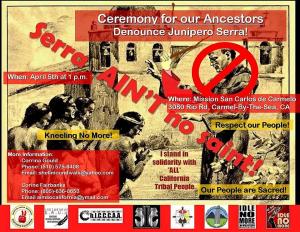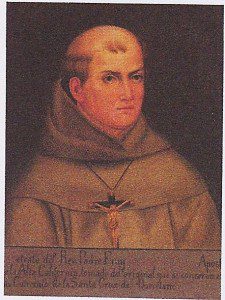In January of 2015 Pope Francis declared his intention to canonize the Franciscan Friar Junipero Serra, who is known by some as the Columbus of California and Father of the California Missions. Native Americans object to his canonization.
History tells us the missions were oppressive. Many indigenous people died because of the brutal treatment they received. Of the 80,000 baptized by the end of the mission era in the 1830s, 60,000 had died, of whom 25,000 were children under 10 years old.
 On Easter Sunday members from a variety of California tribes from around the state gathered near the unmarked burial sites of their ancestors located on the Carmel Mission grounds. This is the mission where Fr. Serra is interned.
On Easter Sunday members from a variety of California tribes from around the state gathered near the unmarked burial sites of their ancestors located on the Carmel Mission grounds. This is the mission where Fr. Serra is interned.
Because of its association with resurrection this High Holy Day for the Catholic Church was picked for the indigenous ceremony. The gathering’s expressed purpose was to remember and honor, or resurrect, these ancestors by extending love to them and sympathy for all they had suffered. Those participating feel the Catholic Church is ignoring the people they colonized.
I attended the ceremony. Many prayers and feelings of sadness were shared. While a desire for reconciliation and forgiveness was expressed, acknowledgment of the truth about the behavior of Serra and the others who operated the missions was demanded. Canonization of Serra is seen as doing exactly the opposite.
Request to Rescind
On February 24, 2015, Valentin Lopez, Chairman, Amah Mutsun Tribal Band sent a letter to Pope Francis asking him to rescind his decision to canonize Fr. Serra. It is well worth reading as it details the grievances of Native Americans with supporting descriptions of the brutal treatment indigenous people received at the hands of the Spanish clergy. It includes quotes from Fr. Serra’s own writings calling for sadistic punishment of those who had been captured and enslaved.
Full text of the letter is posted at: http://amahmutsun.org/wp-content/uploads/2015/02/Letter_to_Pope_Francis_re_Serra.pdf

At the ceremony, participants claimed they felt betrayed by the action, their humanity not respected. I agree. By honoring Serra as a moral leader, the Church is sanctioning behavior that in no way honors the dignity and worth of each human being, a UU principle. Lopez comments: “How Fr. Serra is worthy of public veneration based upon actions most people would consider to be evil is unfathomable.”
The damage this treatment inflicted is not only in the past. It continues in the lives of the descendants of those who were tortured and murdered. This is called historic trauma. From Lopez’ letter:
“Current Tribal members continue to suffer from the impact of cumulative emotional and psychological wounding, which is otherwise known as historic trauma. This trauma resulted from the generations of physical and emotional brutality as well as the attempted cultural and spiritual genocide of all California native people. Our ancestors endured this brutality not only during mission times but this legacy continued during the Mexican and American periods. Historic trauma also results from the fact that from mission times to the present our legitimate past and our humanity as indigenous people have never been truly acknowledged by any governmental or religious organization.”
Why should this matter to UU Pagans?
In 1995 we included as one of our sources of our living tradition “the Spiritual teachings of Earth-centered traditions.” The Covenant of UU Pagans was a key voice in the educational and advocacy efforts that lead to the successful inclusion of this additional source.
In Rise Up and Call Her Name (the curriculum I authored which was published by the UU Women’s Federation in 1995, reissued 2007)) we honor Native Americans. A cultural sensitivity note from Rise Up states:
“It is important to be aware, especially when exploring Native American spiritual beliefs, of the often brutal treatment Native Americans have received historically at the hands of Europeans and others who came to North America. It is also important to understand that many social problems which occur in Native American communities (both urban and on reservations) can be traced directly to historical and often ongoing discriminatory treatment.”
The drumming and singing that was offered throughout set the sacred tone of the ceremony. Many shared moving accounts of their family stories. One woman spoke of her grandmother having been sexually trafficked and noted the worldwide current trafficking of women that continues. Another spoke of the cruel treatment his mother received in the boarding school she was forced to attend, where it was forbidden to speak native languages. Many prayers where offered in the variety of languages that were represented, with encouragement to continue to learn and speak in these original languages.
The message delivered by one of the speakers captured the attitude I felt from the diverse group of indigenous identified people attending: “We must live our lives without anger, hatred or violence. Based on our history, it is not easy to live life without anger; it is not easy to live our lives without hatred; it is not easy to live our lives without wanting reprisals, revenge, or violence. But we all know it has never been easy to be Native American.”
This situation demands we exercise our own ethical authority. Holding up Fr. Serra as a moral leader is an insult to American Indians. Because the Vatican is a global opinion shaper, the action taken by the Pope has far reaching impact. Attitudes toward indigenous peoples around the world will be affected. It is vital that those of us who embrace earth-centered spirituality recognize the viewpoints these protests are voicing, giving these people who have suffered so much in the past and present the respect they deserve.

















